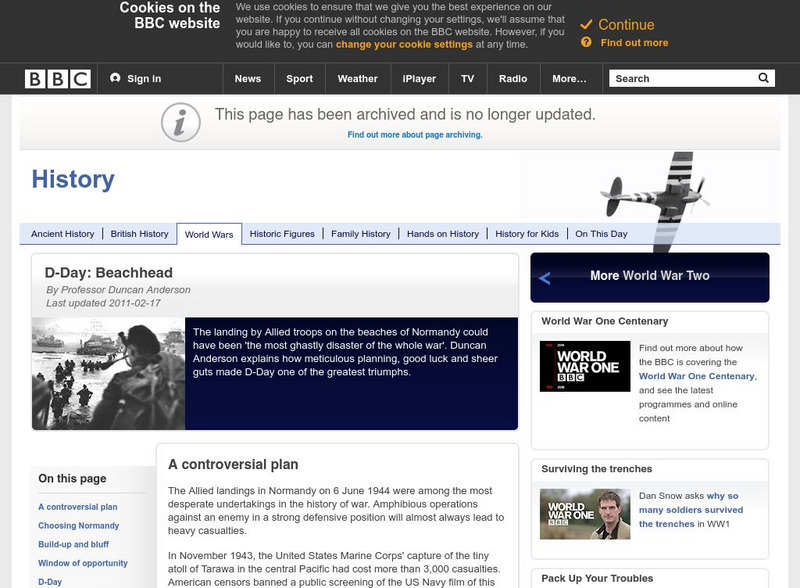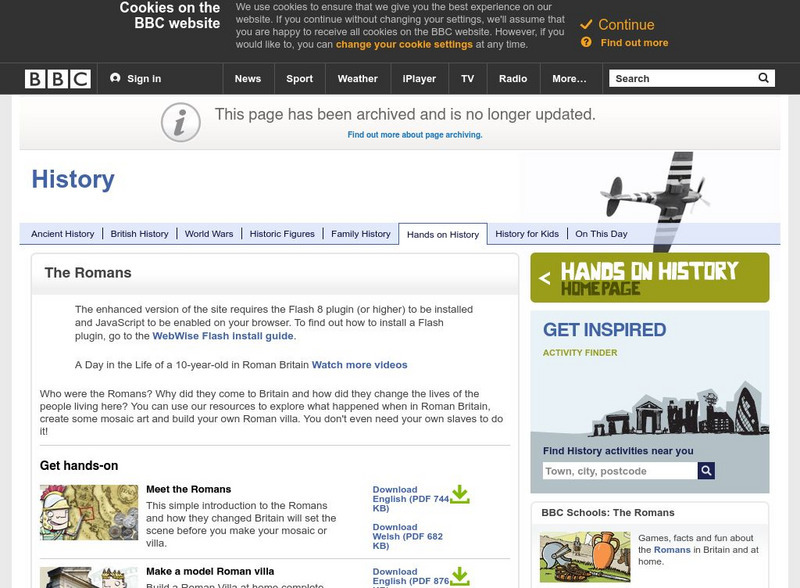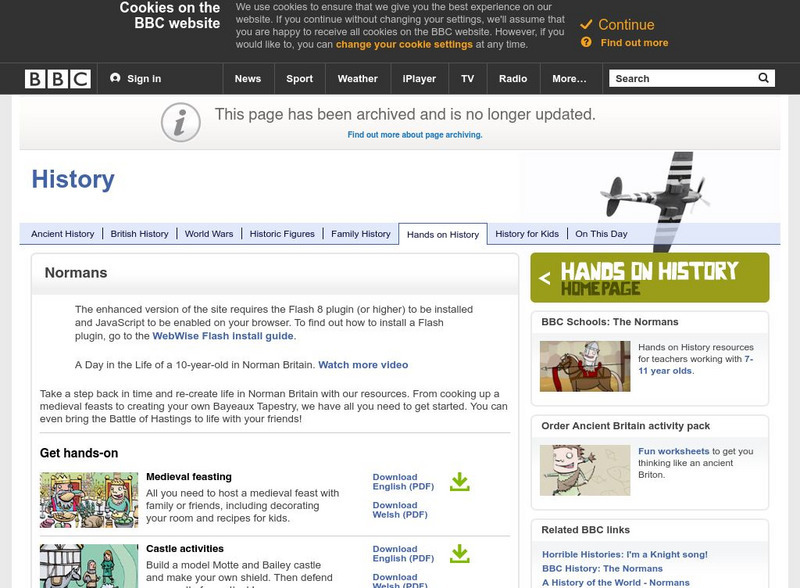Hi, what do you want to do?
BBC
Bbc: History: Winston Churchill: Defender of Democracy
Historian Geoffrey Best explores the transformation of Winston Churchill from a gifted politician to the victorious leader of the British nation. Churchill led Britain through World War Two with unique assurance and changed his country's...
BBC
Bbc: History: Hitler and 'Lebensraum' in the East
History professor Jeremy Noakes explores Hitler's quest to acquire more land for the German people to populate. He traces the origins of Lebensraum and discusses why Hitler was committed to the east to expand.
BBC
Bbc: World War Two: The Battle of El Alamein
Professor Richard Holmes discusses the importance of the epic victory at The Battle of El Alamein in 1942 which did much to restore British morale during World War Two.
BBC
Bbc: History: The 'D Day Dodgers'
Professor Richard Holmes examines the 'D-Day Dodgers', a group of Allied servicemen who fought in Italy during the Second World War, and asks whether our obsession with Normandy has distorted history.
BBC
Bbc: History: D Day: Beachhead
Historian Duncan Anderson explores the landing by Allied troops on the beaches of Normandy and discusses how meticulous planning and preparation, good luck, and bold decisions made D-Day a triumph instead of the 'ghastly disaster' it...
BBC
Bbc: The Battle of Arnhem (Operation Market Garden)
Producer Mark Fielder explores how an Allied victory at The Battle of Arnhem (Operation Market Garden) could have shortened World War Two by six months, and how the plan failed at the last moment.
BBC
Bbc: History: Why Churchill Lost in 1945
How did Winston Churchill, a national hero, lose the general election of 1945 to a landslide victory of the Labour Party? This article examines how Churchill's fame as a war leader worked against him and made him redundant resulting in...
BBC
Bbc: Hands on History: Ancient Britain
Journey back to ancient Britain by exploring important events in history, building your own stone circle, and creating cave art.
BBC
Bbc: Hands on History: The Romans
Who were the Romans? Find out why they came to Britain and how they changed the lives of the people living there. Explore the history of Romans in Britain, create some mosaic art, and build your own Roman villa.
BBC
Bbc: Hands on History: Normans
Download activities covering castles, medieval feasting, creating your own Bayeaux tapestry, and the Battle of Hastings to re-create life in Norman Britain.
BBC
Bbc: Bitesize: What Is Code?
Learn all about coding including some background of what it is and how it works. Play a game that helps with the understanding of what can be programmed.
BBC
Bbc Nature: Jumping Spiders
Jumping spiders contain over 5,000 species making Salticidae the largest of the spider families. They are widely distributed over the planet and can even be found up Mount Everest. Learn more about jumping spiders in this...
BBC
Bbc Nature: Crocodile Family
Crocodiles and the dwarf crocodile is a family of reptiles within the Crocodile order. The Nile crocodile, American Crocodile, and mugger crocodile are example members of this family. Learn more about the crocodile family in this...
BBC
Bbc Nature: Dasyurid Marsupials
Dasyurid marsupials are native to Australia and New Guinea. The most famous dasyurid is the Tasmanian devil, but there are another 60 species in the family. Learn more about dasyurid marsupials in this well-constructed overview produced...
BBC
Bbc Nature: Doria's Tree Kangaroo
Doria's tree kangaroos are the heaviest tree-dwelling marsupials in the world. They can perform some impressive leaps of around 10 meters between trees and 18 meters to the ground. Learn more about the droid's tree-kangaroo in this...
BBC
Bbc Nature: Megabats
Megabats are one of the two types of bats, the others being the insect-eating bats. The megabats are fruit bats, and most species cannot echolocate. Learn more about megabats in this well-constructed overview produced by the BBC. This...
BBC
Bbc Nature: Whales, Dolphins and Porpoises
Whales, dolphins, and porpoises belong to the order Cetacea. These are aquatic mammals that have streamlined bodies highly evolved for swimming. Learn more about whales, dolphins, and porpoises in this well-constructed overview produced...
BBC
Bbc Nature: Rhinoceroses
Rhinoceroses are megafauna and all five species alive today can reach over a tonne in weight as adults. While all the rhinos have horns, only the African species use them to fight with rivals. Learn more about the rhinoceroses in this...
BBC
Bbc Nature: Capuchin Monkeys
Capuchin monkeys are tree-dwelling New World monkeys that live in central and southern America. These intelligent and clever monkeys use tools such as stones to crack open nuts, shellfish, and crabs. Learn more about capuchin monkeys in...
BBC
Bbc Nature: Walruses, Seals and Sea Lions
Dive in amongst the pinnipeds - the seals, walrus and sea lions - for a taste of what life is like for fin-footed, semi-aquatic mammals. Flat flippers help give these typically rotund, barrel-shaped animals an unlikely grace and beauty...
BBC
Bbc Nature: Weasels
Weasels include the stoats, ferrets, and polecats, as well as the European mink. The smallest is the least weasel of North America, which weighs a maximum of 250g, though much smaller ones are known. Learn more about weasels in this...
BBC
Bbc Nature: Falcons, Hobbies and Kestrels
Falcons, hobbies and kestrels are all in the genus Falco. In general terms, the larger birds are falcons; the smaller swift ones possessing long, narrow wings are hobbies and; those that hover while hunting for prey are the kestrels....
BBC
Bbc Nature: Spotted Flycatcher
Spotted flycatchers are a menace to all flying insects. From a high vantage point, they perch upright and alert waiting patiently for an unsuspecting insect to fly past. Learn more about the spotted flycatcher in this well-constructed...
BBC
Bbc Nature: Crows and Ravens
Crows, ravens and their relatives are famed for being very intelligent birds. Several species, including the Caledonian crow and the rook, are known to use tools. Learn more about crows and ravens in this well-constructed overview...




























